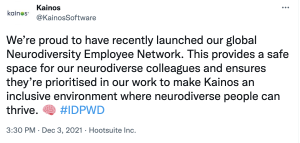One thing I’ve noticed, since I started blogging and talking more openly about being Neurodiverse myself, is how many people have reached out to me virtually or in real life to chat about how they as parents support their children who are (or might be) neurodiverse.
I’ve spoken publicly many times (especially on twitter) about the journey we’ve been on as a family to get my son’s diagnosis; and to get him the support he needs at school etc. The process to get an EHCP in and of itself was a minefield; and finding a secondary school that could not just ‘cope’ with his ASD and ADHD, but actually allow him to thrive; far harder than it should have been!
Interestingly, since joining Kainos and the Neurodiversity working group, I’ve had a number of colleagues approach me to get advice from someone, or just have someone to talk too; who has a neurodiverse child themselves and is perhaps ‘further along in the process’. Far more people in fact than have contacted me to chat about having ADHD myself.
The official services that exist to support neurodiverse children and their families are massively over subscribed and underfunded so trying to get accurate advice and support isn’t that easy. This leaves many parents and carers relying on the internet for help. If you google “does my child have ADHD or Autism” you’ll get a bazillion results back, and it can be quite overwhelming knowing where to start. They’re a millions of Facebook groups and online forums out there for parents and carers looking for help or advice on how to best support their neurodiverse children. The problem is different countries and regions do things in different ways; so what worked for one family in the US, won’t necessarily work for another family in the UK; heck the process a family in London followed won’t even necessarily be the same process that a family in Manchester has to follow.
Many organisations ask staff to disclose if they are the parent to a child with caring needs; but many parents won’t think about ticking that box unless their child has complex physical healthcare conditions, which can leave them in a tricky position (unless they have an understanding manager) when they start needing time off in order to navigate the confusing waters of getting their child a diagnosis or support for neurodiversity.
When I first started down the diagnosis pathway for my son (over 6 years ago) I was still working in the public sector, and was very lucky to have a line manager who herself was in the process of trying to get a diagnosis for her son; we were able to swap tips and advice; and she was very understanding of the multiple appointments I had to attend to try and get my son help. But I know from talking to other parents, not everyone is that lucky. Many have had to either go part time, or give up work altogether, in order to be able to support their children, let down by the systems that are meant to support them.
As we move into ‘the new world’ post pandemic, so many organisations are recognising the importance of focusing on their culture and their staff’s wellbeing; which is great to see. Within Kainos we’ve been having a number of really good conversations about how we better support our neurodiverse staff to thrive; and how we can create an inclusive culture that ensures ‘our staff who choose to remain working from home for what ever reason are fully supported.

More companies now a days are prioritising private healthcare as part of their staff offer; however, as ADHD and Autism etc. are not acute disorders; most healthcare insurers don’t cover them, nor will they cover any treatment for conditions relating too or arising from them. The ones slight exception to this seems to be Bupa. Recently, Bupa has removed ADHD from its general restrictions list which means they will now cover mental health conditions (such as anxiety, stress, and depression) even if they relate to or arise from ADHD; and they will also fund diagnostic tests to rule out ADHD when a mental health condition is suspected.
With waiting lists for adult diagnosis averaging at 2 years+ for the NHS, and 6 months+ for private diagnosis; the picture for children isn’t much better; with the average NHS waiting list being around 18 months; but some trusts have been reporting waiting lists of up to 7 years for diagnosis and titration (where appropriate). Should you choose to go private, the costs for children’s assessments are higher than for adults; with the costs for a child ADHD assessment ranging from £700 to £1,500 for the diagnosis alone; and for ASD the costs range from £1700 to over £3,500; and while the waiting times may be shorter; not all local authorities will accept a private assessment as proof of a diagnosis or eligibility for support.
Leaving aside the process of getting diagnosed; for parents and careers there’s also the stress of trying to get your child the help they’ll need at school. The process of getting an EHCP is a logistical nightmare; and there are whole forums and sites out there dedicated to helping parents figure out how to apply for an EHCP. Even once you’ve managed to figure out how to get the ball rolling, getting the EHCP finalised and put in place as no easy task. While the law states EHCP’s should be finalised within 20 weeks; some local authorities had such large backlogs, even before the pandemic, that the process was reported to be taking over two years to get in multiple areas.
On top of that, a 2012 survey of teachers found that over 70% of mainstream teachers didn’t feel that their training adequately prepared them to teach pupils with special educational needs. It’s possibly no surprise in that case that almost 30% of neurodiverse children in 2019 were being homeschooled; and that number is believed to have gone up during the pandemic.

The pandemic has had another impact on children and young people; with the number of children suffering with mental health issues rising dramatically. Perhaps unsurprisingly, that spike has been especially high for neurodiverse children; and that in turn has been impacting their families. One study in particular noted the negative impact the pandemic has had on parents and families of neurodiverse children.
As such, as employers, we need to be considering not only how we best support our neurodiverse staff, but we also need to acknowledge the extra responsibilities and pressures our staff with neurodiverse children might be facing. We need to create a culture that supports them, so that they can balance their work and parental responsibilities successfully without having to worry; enabling them to thrive at home, and at work.


